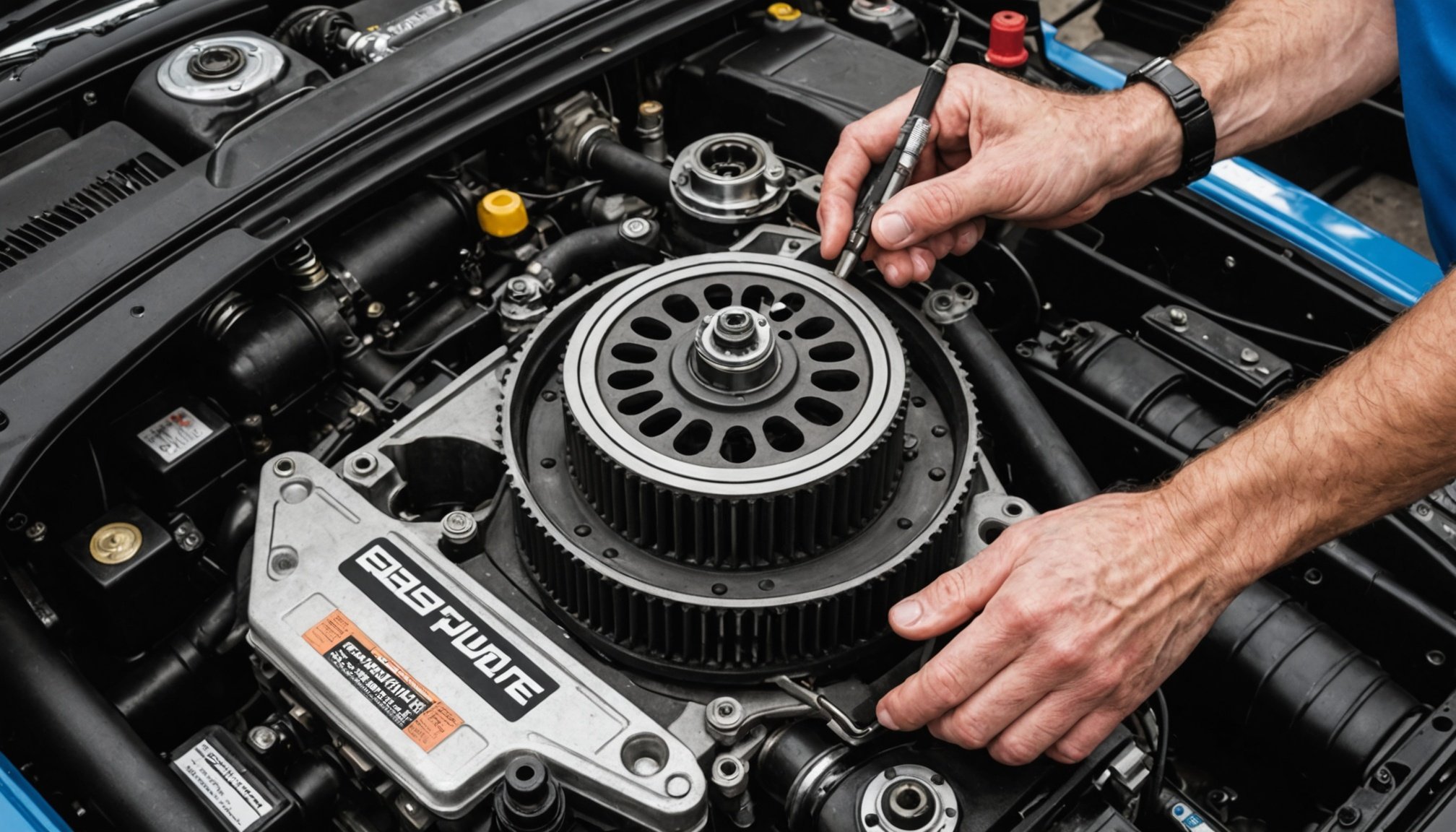The timing belt plays a vital role in your UK sports coupe's performance, impacting engine efficiency and longevity. Understanding when to replace this critical component can save you from costly repairs and ensure your vehicle runs smoothly. Delving into warning signs, manufacturer recommendations, and expert insights will empower you to make informed decisions. This guide will help you maintain your coupe's peak performance, allowing for those exhilarating drives you cherish. Prepare to enhance your driving experience by mastering timing belt maintenance.
Understanding Timing Belts
Timing belts are crucial components in engine operation, particularly in sports coupes where precision and performance are paramount. They ensure that the engine's camshaft and crankshaft rotate in sync, allowing the engine's valves to open and close at the correct times during each cylinder's intake and exhaust strokes. This synchronization is vital for optimal engine performance, as any misalignment can lead to poor engine function or even catastrophic damage.
Also read : What are the signs of alternator failure in British-made commercial vans?
Unlike timing chains, which are made of metal and typically found in larger engines, timing belts are constructed from rubber and reinforced with materials like fiberglass or Kevlar. This makes them quieter and lighter, which can be advantageous in a high-performance sports coupe. However, timing belts have a limited lifespan and require regular maintenance, as they are more prone to wear and tear compared to timing chains.
Maintaining the timing belt in a sports coupe is essential for preserving engine performance. Regular inspections and timely replacements are necessary to prevent unexpected failures. A broken timing belt can lead to significant engine damage, resulting in costly repairs. Therefore, understanding the role and maintenance needs of timing belts can greatly enhance the longevity and efficiency of a sports coupe's engine.
Also read : How to select and install a rear-view camera in an older British hatchback?
Recommended Replacement Intervals
Understanding the timing belt replacement intervals is crucial for maintaining the health of your UK sports coupe. Typically, manufacturers suggest replacing the timing belt every 60,000 to 100,000 miles. However, these intervals can vary based on the specific model and driving conditions.
Factors Influencing Replacement Frequency
Several factors can affect the timing belt's lifespan in sports coupes. Driving habits play a significant role; frequent high-speed driving or aggressive acceleration can increase wear and tear. Additionally, environmental conditions such as extreme temperatures or exposure to dust can also shorten the belt's life. Therefore, it's essential to consider these factors when planning your vehicle's maintenance schedule.
Manufacturer Recommendations
Different manufacturers have specific guidelines for their models. For instance, a popular UK sports coupe like the Jaguar F-Type might have different timing belt replacement intervals compared to a Porsche 911. Always refer to the vehicle's manual for precise information. It's also wise to consult with a trusted mechanic who understands the nuances of your specific sports coupe model. Regular checks and adhering to the recommended intervals can prevent unexpected failures and costly repairs, ensuring your engine runs smoothly and efficiently.
Signs of Timing Belt Wear
Recognising the signs of wear in a timing belt is crucial for preventing severe engine issues. Common indicators include unusual noises such as ticking or squealing, which may suggest the belt is misaligned or deteriorating. Additionally, if your engine misfires or you notice oil leaks around the timing belt cover, these could be symptoms of underlying timing belt issues.
Ignoring these signs can lead to significant consequences. A worn timing belt can snap unexpectedly, causing the engine's valves and pistons to collide. This can result in catastrophic engine damage, requiring extensive repairs. Early detection of timing belt wear is essential to avoid such costly outcomes.
Engine symptoms like rough idling or difficulty starting are also red flags. These symptoms often indicate that the timing belt is not functioning properly, affecting the engine's overall performance. Addressing these issues promptly through regular inspections and maintenance can help mitigate potential damage.
Preventative measures are vital. Regularly checking the timing belt for cracks, fraying, or glazing can prevent unexpected failures. If any signs of wear are detected, replacing the belt immediately is advisable. This proactive approach not only extends the lifespan of your vehicle but also ensures optimal engine performance.
Impact on Performance and Longevity
A well-maintained timing belt is pivotal for enhancing engine performance in sports coupes. It ensures that the intricate choreography of the engine's components operates seamlessly, allowing for optimal power delivery and efficiency. When the timing belt functions correctly, it prevents misalignment, which can lead to engine inefficiencies and reduced performance. This precision is especially crucial in high-performance vehicles where every fraction of power counts.
Timely replacements of the timing belt offer significant long-term benefits. For sports coupe owners, adhering to recommended replacement intervals not only safeguards against catastrophic engine failures but also extends the vehicle's longevity. Regular maintenance can prevent costly repairs, ensuring the engine remains in peak condition over time.
Case studies have highlighted the performance improvements seen in sports coupes post-replacement. For instance, a Jaguar F-Type owner reported smoother acceleration and improved fuel efficiency after a timely timing belt change. Similarly, a Porsche 911 showed enhanced throttle response and decreased engine noise following the replacement. These examples underscore the tangible benefits of maintaining and replacing the timing belt as needed, reinforcing the importance of this often-overlooked component in preserving both performance and longevity.
Comparing Sports Coupe Models
When considering a sports coupe, understanding the timing belt specifics across different models is crucial. Each model may have unique specifications, affecting both performance and maintenance needs. For example, the Jaguar F-Type typically features a robust timing belt designed for high-speed performance, while the Porsche 911 might use a variant optimized for longevity and efficiency.
Reliability ratings often highlight differences in timing belt performance across brands. User experiences can vary significantly; some owners report fewer issues with certain models, attributing this to superior engineering and materials. For instance, Audi TT owners frequently praise the reliability of their timing belts, noting minimal need for replacements compared to other brands. Conversely, some BMW Z4 users have experienced more frequent wear, impacting overall satisfaction.
When comparing sports coupes, prospective buyers should consider these factors. Models with higher reliability ratings and positive user feedback on timing belt performance can offer peace of mind and reduce long-term maintenance costs. Recommendations often lean towards models with a proven track record of timing belt durability, such as the Audi TT, which combines performance with reliability. Understanding these nuances ensures that buyers can make informed decisions, aligning their choice with their expectations for performance and maintenance.
Resources for Replacement and Maintenance
Maintaining the timing belt in a sports coupe is crucial, and finding the right timing belt replacement services can make all the difference. In the UK, several reputable mechanics and service centers specialize in sports coupe maintenance. These experts understand the intricacies of high-performance vehicles and offer tailored services to ensure optimal engine function.
Choosing a skilled mechanic for your sports coupe's timing belt replacement is essential. Look for service centers with a proven track record in handling specific models, as they are more likely to have the necessary expertise and equipment. It's wise to consult with other sports coupe owners or online forums for recommendations on trusted UK mechanics.
For those inclined towards DIY maintenance, numerous online resources provide comprehensive guides and tutorials. Websites and forums dedicated to sports coupe enthusiasts often share step-by-step instructions for timing belt replacement. However, it's important to assess your mechanical skills honestly before attempting such tasks.
Keeping detailed service records is not just about maintenance; it's also about preserving your vehicle's resale value. Documenting all timing belt replacements and related services can reassure potential buyers of the car's condition. Proper documentation demonstrates that the vehicle has been well-maintained, which can significantly enhance its marketability.











